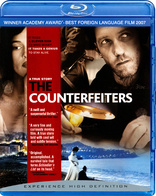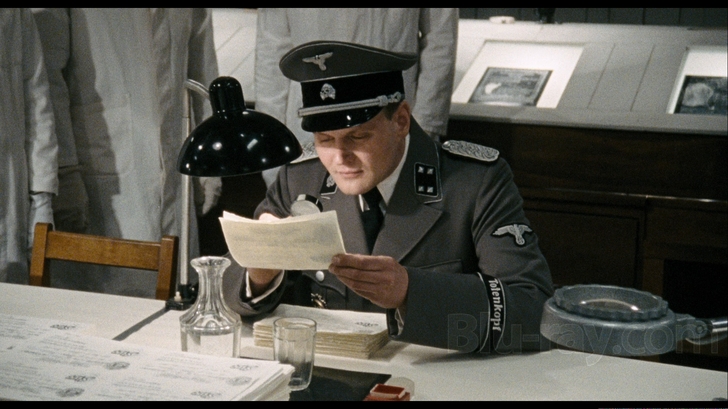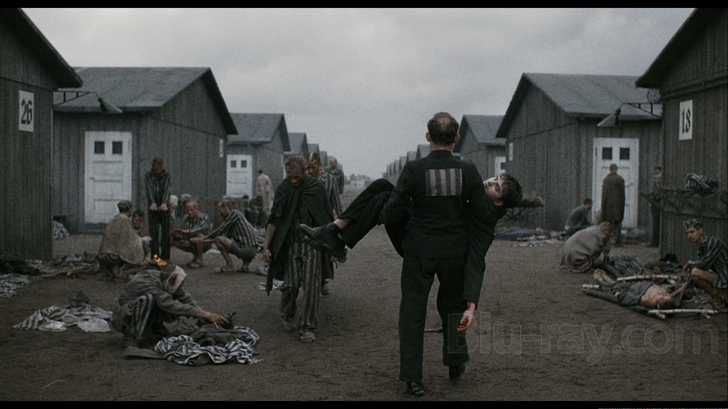The Counterfeiters Blu-ray Movie
HomeThe Counterfeiters Blu-ray Movie 
Die FälscherSony Pictures | 2007 | 99 min | Rated R | Aug 05, 2008

Movie rating
7.3 | / 10 |
Blu-ray rating
| Users | 4.4 | |
| Reviewer | 5.0 | |
| Overall | 4.4 |
Overview
The Counterfeiters (2007)
Tells the true story of Salomon Sorowitsch and the largest counterfeiting operation in history, carried out by the Nazis during WWII.
Starring: Karl Markovics, August Diehl, Devid Striesow, Martin Brambach, August ZirnerDirector: Stefan Ruzowitzky
| Drama | Uncertain |
| War | Uncertain |
| Foreign | Uncertain |
| Crime | Uncertain |
Specifications
Video
Video codec: MPEG-4 AVC
Video resolution: 1080p
Aspect ratio: 1.85:1
Original aspect ratio: 1.85:1
Audio
German: Dolby TrueHD 5.1
French: Dolby TrueHD 5.1
Subtitles
English, English SDH, French, Spanish
Discs
50GB Blu-ray Disc
Single disc (1 BD)
BD-Live
Playback
Region A (locked)
Review
Rating summary
| Movie | 5.0 | |
| Video | 3.5 | |
| Audio | 5.0 | |
| Extras | 4.5 | |
| Overall | 5.0 |
The Counterfeiters Blu-ray Movie Review
The harrowing ordeal of Jews forced to forge U.S. and U.K. currency during WWII is immortalized on "must-see" BD.
Reviewed by Greg Maltz July 30, 2008In recent years, studios have produced a handful of films about the Holocaust, including Schindler's List, The Pianist and now The Counterfeiters. Winning an Academy Award for best foreign language picture of 2007, The Counterfeiters is a dramaticized account of Operation Bernhard. The top-secret Nazi program was designed to flood banks with forged dollars and pounds to destabilize the U.S. and U.K. economies. It failed--partly because Germany had already spent all its money on the war, partly because allied troops were poised for victory and partly because the Jews forced to work on the forgeries managed to delay the Nazis for several months during the project's most crucial stage at the Sachsenhausen concentration camp. More than a story of survival, The Counterfeiters shows how Jews as individuals responded to the moral dilemmas they encountered at the hands of the Nazis. It should be considered mandatory viewing. The acting, cinematography, plot and technical merits are superbly handled. With 1080p and a dynamic Dolby TrueHD 5.1 track, the film is all the more intense on Sony's Blu- ray disc.

Placed in charge of other Jewish craftsman imprisoned at the Sachsenhausen concentration camp, Salomon Sorowitsch (Karl Markovics) tries to save himself and his team.
The main character in The Counterfeiters is Salomon Sorowitsch (Karl Markovics), a Russian immigrant hiding out in Berlin. (Note that Sorowitsch is not the character's real name, which was avoided for legal reasons.) Connected with the German underworld, Sorowitsch pursues his vices of alcohol and women by forging currency, earning him the pseudonym "King of the Counterfeiters". Sorowitsch is a gifted craftsman--good enough to fool Swiss banks and the Bank of England. His past before coming to Germany is not addressed in the film, but in one conversation he reveals that he lost his family in Russia. Whether it is the nightmares Sorowitsch faced in his past, his survival instinct honed by years of criminal activity or his quiet, unassuming demeanor and straightforward style--he has the temperament and resourcefulness to make it through the horrors of Nazi Germany in a way few could. Markovics' performance is masterful. He underplays the role and communicates more through his eyes and mannerisms than his dialog. All the actors are inspired, but Markovics deserves the highest praise for his performance. He wholly captures the endurance of a man under Nazi oppression.
The riveting story makes you quickly forget you are reading subtitles. Early in the film, in 1936, Sorowitsch is arrested in Berlin by the German officer Herzog (Devid Striesow) and sent to Muthausen concentration camp in 1939. His hands blistered and shredded from hard labor, Sorowitsch shows his resourcefulness by stealing some paper and impressing the Nazi guards with his skill in illustration. His drawings and murals earn him decent food and better treatment than the other inmates who are never far from death. To preserve his sanity, Sorowitsch does not let himself become focused on the plight of other Jews in the camp. In fact, many other prisoners resent him for his criminal past and for painting pictures of Nazi officers. But despite his instinct for survival at any cost, Sorowitsch clearly has compassion for others. When he is transferred to Sachsenhasen, he gives his food to another prisoner on the train.
Face to face with Herzog in 1945, after arriving at Sachsenhasen, Sorowitsch begins to realize that he is responsible for more than just his own survival. Herzog provides soft beds, good food and clothes- -even a full-time internal medicine physician to care for them. These perks stand in stark contrast to the inhuman conditions and mass murder all around at Sachsenhasen and other concentration camps. Some of the inmates endure tremendous guilt knowing that their relatives are already dead and that the Nazis continue to perpetrate unspeakable horrors. But the team's focus must shift to the work at hand: forging British pound denominations under threat of death. But one of the men working under Sorowitsch, a typographic expert named Adolf Burger (August Diehl), may be purposefully sabotaging the work.
Burger's ideals of never giving in to Nazi demands jeopardize the entire team. Caught in the middle, and coming under increasing pressure from the Nazis and his men, Sorowitsch must make life or death decisions. The Counterfeiters has a miraculous aura about it in which none of the team comes off as too traitorous or too idealistic--not Sorowitsch with his criminal past; not the team members who want to hand Burger over to the Nazis; not even Burger himself, who in real life wrote the book, "The Devil's Workshop" in 1983, which spawned the film. The viewer can empathize with each individual, whether he wants to embrace death for a chance to subvert Operation Bernhard or cling to life by giving the Nazis what they want. Today, in a time when Holocaust survivors are dying out and Holocaust denial seems to be increasing, such a film is of immense importance.
The Counterfeiters Blu-ray Movie, Video Quality 

It should be stated up-front that many Blu-ray adopters will dislike the grainy, soft picture of
The Counterfeiters. But I find the video quality has much life, even with the small,
supple
grain that is especially visible in scenes lacking adequate light. Part of the appeal is that the movie
is
a period piece that harkens to a time long before digital noise reduction. The copious film grain
lends
a sort of authenticity. It also complements the terrifyingly intimate way the movie was shot--at
least some of it with a hand-held camera. My eye occasionally tricked me into believing I saw real
film. More importantly the BD's picture showed enough vivaciousness and lifelike contrast to
merit
an above average rating. But be warned that not every HT fanatic will like the video quality of this
MPEG-4 codec presentation in 1.85:1. The image is a bit too noisy for the younger generation of
BD
fanatics, accustomed to DNR.
The pervasive grain is apparent from the beginning. Watch the opening scene filmed on the
shore of the French Riviera at Monte Carlo. As the day turns to evening, the insufficient lighting
results in increasingly visible noise that gets in the way of resolution. Still, the picture maintains
appropriate black level and at no time did I see aliasing or pixellation. What the video quality gives
up in definition, it makes up in dynamics and vibrancy and the nostalgic feel of aging film. Watch
the brief scene when Herzog brings Sorowitsch to his residence. The color balance and overall
contrast provide the right skin tones and shading that seems more nuanced than what DVD can
offer.
The Counterfeiters Blu-ray Movie, Audio Quality 

Boasting a Dolby TrueHD 5.1 track (German) at 48 kHz, The Counterfeiters delivers
excellent audio. The first indication of the realism and definition is the sound of small waves
pushing up on the rocky shore of Monte Carlo. In the score by Marius Ruhland, massed strings
present a lush midrange and good resolution. But this is not the most interesting music in
The Counterfeiters. In contrast to much of the action, the signature compositions of the
soundtrack consist of classical tangos recorded decades ago by Argentinean
harmonica player Hugo Díaz. These small ensemble recordings are brought to life in the TrueHD
track. Listen to the resonances of the guitar and harmonica--nearly analog qualities with no
significant digital congestion. The vibrant interplay of instruments and syncopated meters of the
tango clash with the more somber and horrific images of film, but it works on an emotional level.
The team of counterfeiters has an old turntable as well, and occasionally the soundtrack indulges
in old opera recordings from the '30s and '40s. These scratchy old recordings sound remarkably
vivid and natural and, like the tangos, tie into the dark emotions and imagery of the film.
But the real surprise of the The Counterfeiters' audio is the dramatic deep bass content
strategically placed in key scenes. The LFE rumble is often meant to cue up moments of
particular dread or
danger and thunders at a deep, window-rattling level. It can convey terror or simply
suspense, but it is as powerful and organic as the midrange performance. And speaking of
midrange, it is manifest beyond the music. Dialog, sound effects and other audio cues like trains
clacking over the tracks have tremendous presence across the
front channels. The surround channels are assigned relatively little content--mainly ambient
sound--but
that is to be expected in this type of a film. I much prefer this presentation to unnecessary front-
to-rear ping-pong
stereophonics.
The Counterfeiters Blu-ray Movie, Special Features and Extras 

The highlight of the supplementary material is the content featuring Adolf Burger, but each
special feature offers insight into the film, its characters/actors or Operation Bernhard. Of all the
men on Sorowitsch's team, Burger had the strongest resolve to sabotage the Nazi operation,
even though it could have meant his death, and doomed the others as well. His account was
fascinating, scholarly yet personalized. The fact that it came straight from the mouth of a 91 year
old Holocaust survivor lent that much more authenticity not just to the interviews, but to the
feature film. The bonus materials include:
Commentary with Ruzowitzky--Very important, if slightly uneven descriptions of the
film, including technical descriptions. However, much of the content discussed in the commentary
is unavailable in some of the other bonus material.
Making of The Counterfeiters--A ten-minute documentary featuring
informative narration and interviews with Burger, the director and cast, in German with English
subtitles. It also shows Burger lecturing a class of attentive students, which is good to see. In
Dolby Digital (two channel) pieced together from standard definition video of varying quality and
aspect ratio.
Interviews with Burger, Markovicz and Ruzowitzky--Intimate interviews in English and
German (with English subtitles) totaling 48 minutes. In standard definition. We learn countless
fascinating pieces to the story, especially regarding Burger, who reveals he was liberated by
Americans on May 6, 1945. The interview with Markovicz is a delight. He is articulate (in English)
and his zeal for the role of Sorowitsch is made very clear. It's also clear how successfully he
transformed himself and used a minimalist approach to play the lead role.
Deleted Scenes--Four deleted scenes in standard definition, totaling nearly four
minutes. They may flesh out some sequences, but I can certainly understand why they were left
on the cutting room floor.
Original Theatrical Trailer--At two and a quarter minutes, in high definition.
Adolf Burger's Historical Artifacts--More than 19 minutes of technical details and
historical fact, straight from the mouth of the typographical expert who survived to tell us all
about Operation Bernhard. In standard definition, in German, with English subtitles. Burger was
90 years old at the time he collaborated with Ruzowitzky on the film.
Q&A with Director Stefan Ruzowitzky--A 13-minute question and answer session in
English, with the film's director. He explains his approach to rehearsals and shooting the film
quickly, and also discusses the real-life Sorowirsch (a false name used for legal reasons) and what
became of him after the war.
BD Live--Connect to the internet and check it out for yourself.
The Counterfeiters Blu-ray Movie, Overall Score and Recommendation 

Each individual who lived and died in the Holocaust has a story. With similar lessons about
humanity and pure evil, each of these stories would also teach us about a unique individual. If
only directors like Spielberg, Polanski and Ruzowitzky could bring those millions of stories to the
screen...but that will never happen. And that is why films like The Counterfeiters are so
important. Not only because they show some facet of WWII history, but because they reveal a
glimpse into the lives of those who do not have a voice. When I watch films like The
Counterfeiters I am not only overwhelmed by the story of the main characters, but by the
fleeting faces of the extras and secondary actors--faces representing victims whose voices and
lives were taken from them and whose stories I will never hear.
It is heartwrenching to
learn about the Holocaust. The most important way is directly from a survivor. Take, for example,
the story of Greek survivor, Ya'acov (Jack) Handeli. The plight of Greek Jews during the Holocaust
is rarely discussed, but after years of silence, Handeli gives speeches describing his family's ordeal
and the horrors that Jews of Greece endured. During WWII, the Nazis and Greeks destroyed a
thriving community more than 2,200 years old--the oldest Jewish community in all of Europe. In
1943, when Handeli was about 16, his father Shlomo, mother Dudun, brothers Yehuda and
Shmuel, sisters Pearla, Lucia and Ida--all were murdered at Auschwitz. Handeli, who was saved
by American soldiers, described the personality, likes and dislikes of each of his relatives, what
made them unique, why they were important to him. Who will tell their story when he is gone?
The master criminal Salomon Sorowitsch's story is now immortalized in an Oscar-winning film--
even though, ironically, Sorowitsch isn't his real name. But let's realize how this story came to be
told in the words of Burger: "For years, I was silent. I didn't want to speak about this anymore. It
was only when the neo-Nazis started with their lies about Auschwitz that I began to travel
through Germany and give my speeches, to tell people what happened." I can unreservedly
recommend the BD on every level--its technical merits as well as the quality of filmmaking, the
acting and the plot. But as we watch it and learn the story of Sorowitsch, let's not forget the
millions of others caught under Nazi oppression whose stories are not being told: the
overwhelming majority of whom were totally innocent, upstanding, productive members of
societies that failed them.
Similar titles
Similar titles you might also like

La Grande Illusion
Grand Illusion
1937

Germany Year Zero
Germania anno zero
1948

Merry Christmas Mr. Lawrence
1983

Lifeboat
1944

Stalag 17 4K
1953

Seven Beauties
Pasqualino Settebellezze
1975

Stalingrad
1993

The Colditz Story
1955

The Burmese Harp 4K
ビルマの竪琴 / Biruma no tategoto
1956

My Way
마이웨이 / Mai Wei
2011

The Front Line
고지전 / Go-ji-jeon
2011

A Hidden Life
2019

Lebanon
2009

A Man Escaped
Un condamné à mort s'est échappé
1956

The Painted Bird
Nabarvené ptáce / Slipcover in Original Pressing
2019

The Bridge on the River Kwai
1957

The Pianist
2002

The Captain
Der Hauptmann
2017

City of Men
Cidade dos Homens
2007

Cross of Iron
1977